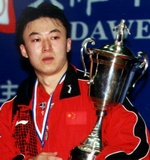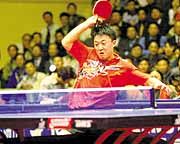November 8, 2000
Interview with Ma Lin
(Chung's Notes: This interview took place on October 15,
the day Ma Lin won the World Cup. The sentences inside [] are the
reporter's comments made after the interview.)
 This afternoon, Ma Lin won the World Cup title in
Yangzhou, beating Kim Taek Soo 3-0. After the last point, Ma
knelt down and was in tears. Not being selected to represent
China at the Olympics was a severe blow to Ma, but the
20-year-old has survived. Tonight, we held an exclusive interview
with Ma.
This afternoon, Ma Lin won the World Cup title in
Yangzhou, beating Kim Taek Soo 3-0. After the last point, Ma
knelt down and was in tears. Not being selected to represent
China at the Olympics was a severe blow to Ma, but the
20-year-old has survived. Tonight, we held an exclusive interview
with Ma.
Reporter: Very few thought that you would beat Kim so cleanly.
Ma: I did not think so, too. I was prepared to play the full 5
games. Before this match, I lost three times in a row to Kim. In
the past, by the time we played the 5th game, Kim would have
adjusted to my serves and my attacks. That's why I don't like
playing the 5th game against him, and I tried to win in 3. I got
my wishes today. [R: Looking at the match, we did not see any
worry or anxiety on Ma's face. He played with a great deal of
patience. This level of maturity is very rare in young players,
and that makes Ma so special.]
R: The scores in your semi-final match against Wang Liqin were
also a little surprising.
M: Some people said that Wang dumped that match to me, because
of the scores. How could that be? Like myself, Wang had never won
a world title; this is a great opportunity to him also. Before
the match I thought that it would be the most difficult for me.
But Wang did not play all that well, and I was able to use all my
techniques. I really played quite well. I added some variations
to my serves, and Wang did not handle them well. [R: You only
have to see how Wang stomped his feet in disgust after his
mistakes to know that he did not dump the match.]
R: Although you practiced with the big ball more than other
players did, you are still not fully adjusted to it yet, right?
M: Realisticaly, I am at about the 60%-70% level (in terms of
understand the big ball). Before the tournament I had the
confidence to win, but I did not expect to play at such a high
level: I only lost one game to Persson in the tournament. About
the big ball, I think one has to first get used to its speed and
spin, and consciously remind oneself that one has to play
differently. Based on that foundation, one has to strengthen
one's technical forte. With the big ball, the changes in my game
principally show up on my backhand. Because the ball is slower, I
can be more deliberate in using my backhand loops. With the small
ball, I was a little nervous about using the backhand loop, and
if I missed a few times, I was afraid to use that shot. Now my
percentage is much higher, and I use it two or three times in a
game. Not only am I more confident, my opponent also feels more
pressure. When you play good players, two or three points is the
difference. [R: From Ma's experience, the inverted backhand loop
has more applicability in the big ball era. This is a good
opportunity for Liu Guoliang and Yan Sen, because it strengthens
the backhand.]
R: The last couple of days you have been coughing. Are you
feeling well? Did it affect your play?
M: I had a cold before I left Beijing, and it is not over yet.
I have been coughing since I came to Yangzhou. The big ball is
slower, and it requires more energy to attack. Also, there are
more extended rallies, so I felt that physically I was a little
questionable. I sweated a lot in the matches, and I felt very
tired afterwards. [We have not heard Ma mention his physical
condition in the press meetings, but he was always coughing in
those meetings.]
R: You cried after the finals. Tell us how you really felt.
M: That was a really complex feeling, and hard to explain. I
felt it was very tough for me during those days when we prepared
for the Olympics and I was not on the team. I don't know how I
made it through. Especially on the day the team left for Sydney,
when I saw that they were so happy and excited, and I had to
continue training with those who were not going. That feeling was
very hard to describe. When I won the tornament today, I felt
that life has been fair to me. [R: For someone prepared to go to
the Olympics, not being selected was like being hit with cold
rain that could put the fire out in one's life. This World Cup
title is the lightest one of the grand slam titles, but Ma still
cried. Through this title, he has proved that he passed the test.
After the storm he can now see the rainbow. He is stronger and
more mature.]
Zhou Lanshun Died in Beijing
Zhou, famous Chinese penholder and member of the Chinese team
that won the team title in 1965, died of cancer in Beijing on
October 23. He was a teammate of Chuang Tze-Tung, Li Furong,
Zhang Xielin and Xu Yansheng; collectively they were called the
"Five Tigers". He was also the second runner-up in the
28th Worlds (1965). Zhou retired from the national team in 1973,
and began a brilliant coaching career. The players he coached
include Guo Yuehua, Chen Xinhua and Cao Yanhua, all world
champions.
Zhou emigrated to Australia in 1986. He became coach of the
Australian national team. He left his post in 1996, and was a
visiting coach for Taiwan for a short period. His daughter
Shirley Zhou was the top-ranked female player in Australia for
years.
Zhou was a political prisoner for 8 months after the 31st
Worlds; that finished his career as a player. He did not talk
much about that part of his life in an interview with Table
Tennis World earlier this year, but it was clear that the
experience left deep emotional scars. As a player, he was famous
for his blocks and powerful smashes. As a coach he was loved by
his players. Cao Yanhua, the world champion in 1983 and 1985,
described her great admiration for her coach in her autobigraphy
"Woman Born In The Year Of The Tiger" with a lot of
interesting anecdotes.
"An athlete's success is determind not only by his
results, but more importantly, by how he is, as a person".
Zhou Lanshun (1939-2000), in a Table-Tennis World Interview.
New Friendship 729 Rubbers For The 40mm Ball
Click here
for a photo of Li Shuzhou, chief
engineer of RITC, and inventor of the Friendship 729 series of
rubbers. The middle picture shows the new 729-40
inverted rubbers, and the bottom picture shows the new 802-40 pips-out rubber. These are new
products developed with the help of the Chinese national team,
the Hong Kong team and the Indonesian team.
Interesting Sydney Olympics Statistics
- Youngest Male Player: Yoo Seung-Min (S. Korea), birthdate
1982/8/5
- Oldest Male Player: EHTESHAMZADEH Majidreza (Iran),
1956/12/14
- Shortest Male Players: Ding Yi (Austria), Damien Eloi
(France), 1.65 m
- Tallest Male Player: Keen (Netherlands), Heister
(Netherlands),1.90 m
- Lightest Male Player: Cheung Yuk (Hong Kong), 58 kg
- Heaviest Male Player: Jindrak (Austria), 87 kg
- Youngest Female Player: Michelle Do, 1983/6/5
- Oldest Female Player: Li Chunli, 1962/2/8
- Shortest Female Player: Okenla, K.(Nigeria), 1.45 m
- Tallest Female Player: Elke Schall (Germany), 1.8 m
- Heaviest Female Player: Musoke, Mary (Uganda), 75 kg
Back to Index
 This afternoon, Ma Lin won the World Cup title in
Yangzhou, beating Kim Taek Soo 3-0. After the last point, Ma
knelt down and was in tears. Not being selected to represent
China at the Olympics was a severe blow to Ma, but the
20-year-old has survived. Tonight, we held an exclusive interview
with Ma.
This afternoon, Ma Lin won the World Cup title in
Yangzhou, beating Kim Taek Soo 3-0. After the last point, Ma
knelt down and was in tears. Not being selected to represent
China at the Olympics was a severe blow to Ma, but the
20-year-old has survived. Tonight, we held an exclusive interview
with Ma. 